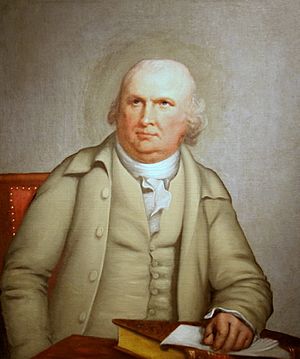Superintendent of Finance of the United States facts for kids
Quick facts for kids Superintendent of Finance |
|
|---|---|
| Department of Finance | |
| Appointer | Congress of the Confederation |
| Term length | No fixed term |
| Constituting instrument | Articles of Confederation |
| Formation | February 7, 1781 |
| First holder | Robert Morris |
| Final holder | Robert Morris |
| Abolished | November 1, 1784 |
| Succession | United States Secretary of the Treasury |
| Deputy | Assistant Superintendent of Finance |
The Superintendent of Finance of the United States was a very important job in America's early history. This person was in charge of the country's money, much like a finance minister today. The office was part of the Department of Finance, an executive office during the Confederation period. Only one person ever held this position: Robert Morris. He served from 1781 to 1784, with help from Gouverneur Morris.
Contents
Why the Job Was Created
Before the Superintendent of Finance, different groups and committees managed America's money. These groups started in 1775 to handle finances for the first US government, the Continental Congress.
However, people soon realized this system wasn't working well. As early as 1776, Robert Morris suggested that one person should be in charge of finances. The Congress was open to new ideas for managing money. They even asked a finance writer from Wales, Dr. Richard Price, to help. He said no. Later, Congress asked their agents in Europe to look into better ways to run government departments. But nothing came from that request either.
The Superintendent's History
In early 1781, three main government departments were created under the Articles of Confederation. These were for finance, foreign affairs, and military matters. On February 7, 1781, the Confederation Congress officially formed the Department of Finance. Its leader was called the Superintendent of Finance.
Robert Morris was chosen for the job on February 20. He accepted on May 14 and officially started in June. The country's economy was in a very bad state. Because of this, Congress gave Morris a lot of power. They even let him continue his private business activities, as he requested. The Superintendent and his assistant worked together as an informal team during the end of the Revolutionary War.
Another important job, the Secretary of Marine, was also created in 1781. This was like an early version of the Secretary of the Navy. Major General Alexander McDougall first held this role. However, this position soon changed to the Agent of the Marine. Robert Morris, as Superintendent, took on this role voluntarily.
Morris worked hard to cut down on all government spending, even for the military. He sometimes used his own money to buy military supplies. He would also borrow from friends or use his own credit. He made sure that all money records were kept very carefully. Morris also pushed the states to provide the money and supplies they were supposed to.
For the 1781 Yorktown campaign, Morris took out personal loans. He also urged the states to provide funding for General George Washington's army. A large loan from France was also needed and obtained for this important campaign.
America's First Bank
The Bank of North America was started in December 1781 by the Congress. It opened on January 7, 1782, thanks to Robert Morris's efforts. Morris used the French loan and some of his own money to fund the bank. This bank was very important for helping to pay for the war.
It was the first bank in the United States created by the government. It acted like an early central bank for the country. The bank continued to operate until 1785, when its special permission to operate in Pennsylvania was removed.
In 1782, Gouverneur Morris, Robert's assistant, came up with the idea for decimal coinage. He even created the word "cent," which is still used for our money today.
After Robert Morris left the Superintendent job on November 1, 1784, a group of people took over his duties instead of one person.
What the Superintendent Could Do
The Superintendent of Finance had powers similar to today's Secretary of the Treasury. In some ways, the job was even like a prime minister in other countries. However, unlike a prime minister, the Superintendent was not a member of the government at the time. This made the job a bit like an early version of the presidency that would be created later.
 | Dorothy Vaughan |
 | Charles Henry Turner |
 | Hildrus Poindexter |
 | Henry Cecil McBay |


